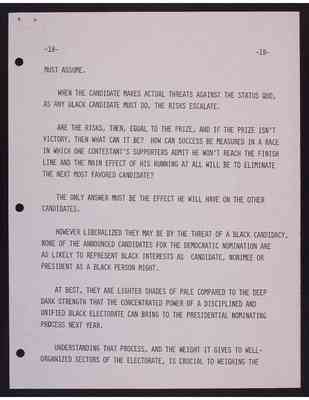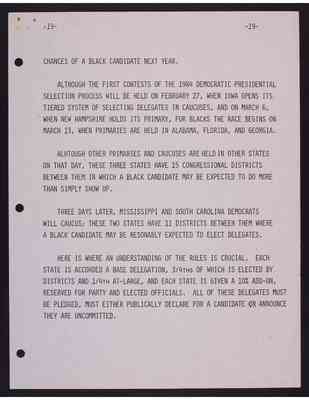Pages
16
-16-
The announced Democratic candidates are surely more aware of the power of black votes -- potential and actual -- than in past campaigns.
In the past, we were often content to vote for candidates because they knew the words to our hymns; today's crop is competing for black votes on a slightly higher plane, offering issues and not emotions.
The incumbents, having deliberately alienated black voters in order to attract the sizeable portion of White Supremacists in the general population, is now engaged in trying to win those voters whose skins are brown, and to avoid alienating those moderate whites who view with horror the administration's regressive civil rights policies.
Why then shouldn't some black person run for President again? Surely not simply to prove to our children that it can be done -- Frederick Douglass proved that almost 100 years ago, and Mrs. Shirley Chisolm reproved it in 1972. Others proved it before and since, giving ample testimony that a black person can run for President, as a Democrat, a Republican, or representative of practically any party. It was already been done.
To suggest that doing it again in 1984 proves a point somehow unproven to date, negates our history, and cheapens our past struggles.
That history is worth reviewing, briefly.
17
-17-
It isn't surprising that the history of efforts by blacks to be nominated by political parties large and small is so sketchy -- black people weren't even invited to an inaugural ball until 1949.
If Douglass was the first black to receive a Presidential vote at a Republican convention, in 1888, the Rev. Channing Phillips of the District of Columbia seems to be the first black to get a vote at the Democratic nomination, 80 years later in 1968. He received 67.5 votes.
1968 was notable because two other blacks ran for President that year as well -- Dick Gregory as candidate of the New Party, and Eldridge Cleaver as nominee of the Peace and Freedom Party.
Four years later, in 1972, former U.S. Representative Shirly Chisolm made what must be considered the best organized and best financed race to date for a major party's nomination.
She won 28 delegates, and received 151.25 votes at the Convention, losing to George McGovern.
With such a record of past efforts behind us, some other justification must be found today to rationalize what will be a great expenditure of material and human capital, and the enormous risks taken by the person who offers as candidate.
The risks are real, for personal and character assassination are realistic chances any Presidential Candidate, white or black,
18
-18-
must assume.
When the candidate makes actual threats against the status quo, as any black candidate must do, the risks escalate.
Are the risks, then, equal to the prize, and if the prize isn't victory, then what can it be? How can success be measured in a race in which one contestant's supporters admit he won't reach the finish line and the main effect of his running at all will be to eliminate the next most favored candidate?
The only answer must be the effect he will have on the other candidates.
However liberalized they may be by the threat of a black candidacy, none of the announced Candidates for the Democratic nomination are as likely to represent black interests as candidate, nominee or President as a black person might.
At best, they are lighter shades of pale compared to the deep dark strength that the concentrated power of a disciplined and unified black electorate can bring to the Presidential nominating process next year.
Understanding that process, and the weight it gives to well-organized sectors of the electorate, is crucial to weighing the
19
-19-
chances of a black candidate next year.
Although the first contests of the 1984 Democratic Presidential selection process will be held on February 27, when Iowa opens its tiered system of selecting delegates in caucuses, and on March 6, when New Hampshire holds its primary, for blacks the race begins on March 13, when primaries are held in Alabama, Florida, and Georgia.
Although other primaries and caucuses are held in other states on that day, these three states have 15 Congressional districts between them in which a black candidate may be expected to do more than simply show up.
Three days later, Mississippi and South Carolina Democrats will caucus; these two states have 11 districts between them where a black may be reasonably expected to elect delegates.
Here is where an understanding of the rules is crucial. Each state is accorded a base delegation, 3/4ths of which is elected by districts and 1/4th at-large, and each state is given a 10% add-on, reserved for Party and elected Officials. All of these delegates must be pledged, must either publically declare for a candidate or announce they are uncommitted.
20
-21-
Then each state receives another add-on of delegates, also reserved for Party and elected Officials. These delegates will be unpledged. Half of all delegates will be men.
As a general proposition, a Presidential candidate must receive 20% of the votes cast in a district; without that 20%, he fails to place at all. Only 86 on the United States' 435 Congressional Districts have a 20% or greater Black population.
It is clear then a Black candidate must win, and win well in those 86 districts, unless he or she can count on something neither Harold Washington or Wilson Goode could -- votes from a large minority of non-black voters.
You may know that the Joint Center for Political Studies has developed a "best case" scenario for a Black candidate in 1984. Their research suggests that 778 of the 3,923 delegates to the 1984 Democratic Convention in San Francisco can be Black, and that as many as 250 of those delegates could be pledged to a Black candidate.*
The Joint Center sums up the risks as well.
As we have noted, one risk is drawing votes away from a candidate who, in the absence of the Black candidate, would be the most attractive nominee to Black voters.
In that same vein, overwhelming support for a Black candidate who nonetheless does not receive enough delegate votes to block or influence the nomination, leads inevitably to the selection of a white candidate chosen with little participation from Black voters, and little reason to be responsive to their concerns.
There are other risks -- suffice it to say that this process ought not be enteres upon as cavalierly as has apparently been true in the past.
*Outlook for a Black Presidential Candidacy, the Joint Center for Political Studies, Washington, D.C., March 10, 1983.




